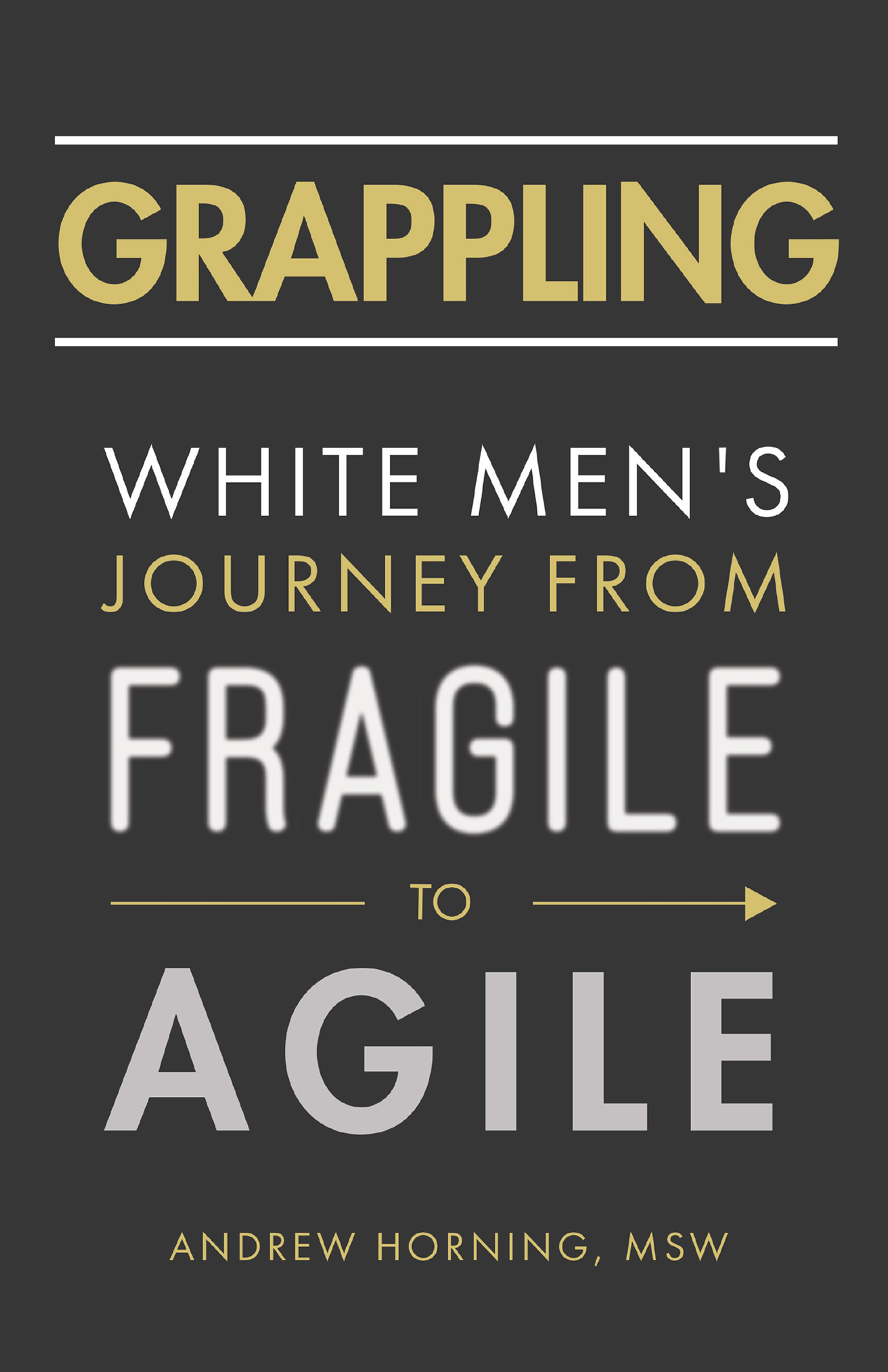
This article is written in partnership with Andy Horning—he’s dedicated to helping us become agents of change, not victims of progress, and we’re honored to work with him. ~ed.
“Shame corrodes the very part of us that believes we are capable of change.” ~ Brené Brown
Shame sucks—and it’s not who we are.
But we can’t overcome it by avoiding or getting angry about the stuff that makes us feel ashamed. We can’t hide behind a “woke” identity, either.
The only cure for our shame is for us to face it, and that takes courage, for sure. But what we often forget is that it also takes compassion.
Being German, on one of my high school trips, I visited the Holocaust memorial at Dachau.
I will never forget the gas chambers or the hooks on the wall for the nooses in the crematorium. The cruelty they stand for is burned into my memory. It was a traumatic and confronting experience that forever shaped my view of the world…
Now, here I am writing about the Black Lives Matter movement, the Trump presidency, and other socially-charged current events.
I am often surprised by the hatred I face in the comments on social media for calling out racism, inequality, and other problems of our time.
I have to admit that I often get angry when that happens; I get upset by what I see as the ignorance of these folks who are throwing insults at me. But lately, I started thinking about why they’re so upset.
I remember a situation where someone punched me in the face for making a pretty good point in an argument. I had the courage to share my truth but lacked the compassion to see how much my brutal honesty hurt the other person.
Years later, I realize that this outburst of aggression was not directed at me—it was the shame the other person felt that translated into violence.
After years of victimizing myself, I read a book called Grappling: White Men’s Journey from Fragile to Agile by Andy Horning and started asking myself, “What’s my role in this? Why do I keep upsetting folks so much? And what does my identity as a white male have to do with it?”
When I started reading the book, I saw myself as a role model for non-toxic-masculinity, but that didn’t last long…
“Grappling is defined as ‘engaging in a close struggle without weapons.’ You might have an image of a wrestling match or MMA fight in your mind right now. But I’m not talking about physical grappling. What I’m talking about is the kind of grappling that happens in our hearts, in our minds, in our relationships.
Grappling is having the hard conversation with your spouse. Grappling is confronting your inner demons, instead of allowing them to leak onto those around you.
Grappling is going towards pain, instead of away from it.” ~ Andy Horning
Five things I learned from Grappling that changed my perspective on masculinity:
1. Shame is a two-way street.
When I see white men defending police officers who use excessive force against minorities, I feel ashamed of being a white man. My first impulse is to lash out at all cops, white men, and strangers on the internet—but unfortunately, that creates shame on their side, which leads them to attack me. It doesn’t solve any problems; it actually makes them worse.
What would it look like if the United States created compassionate memorials of the things that cause the nation to feel ashamed?
When we bring awareness to shame, we take away its corrosive power. This is the beginning of grappling:
“We can acknowledge, ‘I was temporarily an asshole. That’s not who I am. That’s not who I want to be toward others. We want to recognize that shame is there, but we are not our shame.”
2. Forget the scoreboard: it’s not about being right.
As long as I simply think about making my point and being right, I am not fully open to hearing the other side. While I read or hear their argument, I am already thinking about how to invalidate their words—as if this were a sports game. This is how most men grew up: we are told to stand up for ourselves, never to give in, and to prevail whenever possible. But the process of grappling gives us an alternative:
“Don’t play the scoreboard. Play the process. When we play the scoreboard, we’re focused on who’s winning, which creates a bit of a disembodied experience.”
3. Courage and compassion need to be balanced.
It’s one thing to bash all police officers by calling them racist, and another thing to show compassion toward those who aren’t racists. It is easy to accuse all rich, white men of exploiting the working class, and another thing to acknowledge their daily struggle to keep their business going. It’s not hard to tell our partner that they upset us, but it’s challenging to recognize their struggle that led them to act in a way that caused our anger. Courage without compassion doesn’t get us anywhere when arguing with someone:
“Think of courage as a gas pedal that takes us forward into life with all its challenges. Compassion is the brake that helps us slow down around the corners that require more attention and a slower speed.”
4. Exercise your “moment muscle”: our first thought is not always the best.
Being quick-witted is somehow glorified as a masculine quality when it comes to business or arguing with others. We all have that one friend who has a snarky comment ready within seconds if they disagree with someone, but maybe that is part of the problem. When we only react to make our point in the strongest way possible, we might hurt others without even noticing. It takes time to build up the ability to avoid this habit of reacting, just as it takes time to build a muscle:
“It becomes much more efficient as we practice it, as we build up what I call the ‘moment muscle’—being self-aware in the moment and knowing from that place what to do next.”
5. Vulnerability is strength.
As men, we are taught to be strong, but we often confuse strength with stubbornness. Just as women feel the cultural pressure to keep up their physical appearance, men feel the urge to maintain the illusion of being emotionally stable. I remember situations where I tried to make my partner feel protected by having an answer to every problem, but actually worsening the situation by not listening to her ideas.
Taking control of every situation that is presented to us is not necessarily a sign of strength, it could also be interpreted as a lack of trust in our partner.
“Of course, it still hurts a bit, but that’s slowly going away because I always have access to the tenderness that is there inside of me. I can call on that tenderness to wash over the part of me that made the mistake. The place where self-compassion meets mistakes is the birthplace of self-forgiveness for my past and the beginning of a more authentic future.”
Once we stop standing our ground and start grappling with the actual situation we open ourselves to a whole new way of experiencing relationships.
And that is the good news Horning is presenting to all of us “representatives of toxic masculinity”: it is not our fault that we are this way, but it is our responsibility to change.
We’ve got nothing to lose and so much to gain.
Do you know that feeling when you feel uncomfortable around a group of man-bashing feminists? Have you ever felt ashamed of being white when Black Lives Matter activists point out your privilege?
We don’t have to feel this way once we choose to be an agent of change and become an ally to those who are questioning toxic masculinity.
After all, as men we suffer from toxic masculinity; there is no benefit for us in keeping the status quo—we don’t want to feel ashamed of ourselves.
Letting go of the urge to always be right gives us the chance to change our perspective and evolve as human beings.
Looking at suicide rates, alcoholism, and burnout among white men, we clearly see that something needs to change for our own sake, too, rather than just for the sake of others.
It’s 2021, women don’t need someone to mansplain the world and pay for everything. It’s time to let go of that pressure. Our fragility stems from the feeling of not being good enough. This is something we have in common with women—just in different areas of our lives.
Maybe we can start from there and try to evolve as allies, not as rivals?
Shame can be a source of inspiration to do better, once we let go of the idea that good men make no mistakes.
As long as we stubbornly hold onto outdated gender roles and interpretations of masculinity, we are like a piece of wood: sturdy, but not flexible and therefore fragile. Let’s be like bamboo instead.
Flexibility is what protects us from breaking and makes us agile.
Your most important read all year: equally powerful for both ladies and gents.
Get your copy >>
Watch: Waylon interviews Andy Horning, author of Grappling.
The other day I interviewed Andy Horning about how we silly, scared, mean, kind ol’White Men can wake the eff up, even if we don’t think we need to. It’s an awkward, shaky, delightful path. Here’s what we said. ~ Waylon
 Share on bsky
Share on bsky


Read 10 comments and reply